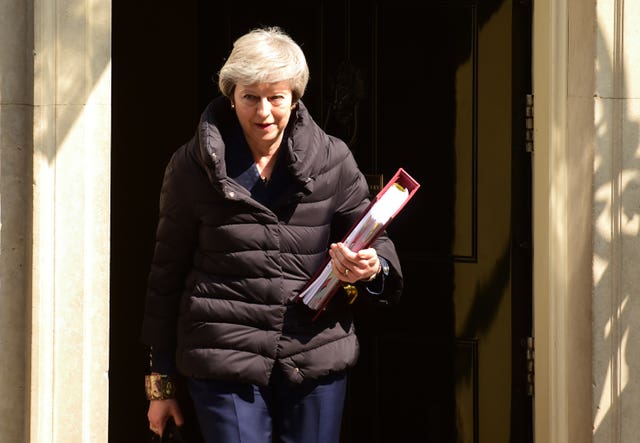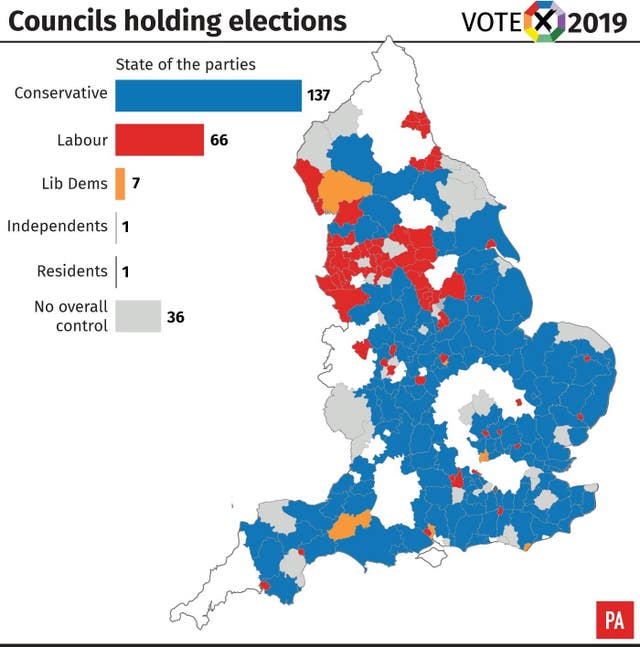
Polls have closed in local elections that were predicted to add to the woes of embattled Prime Minister Theresa May.
The contests across England and Northern Ireland came as the Government was engulfed in controversy following the dramatic sacking of Gavin Williamson as defence secretary.
Mrs May has also been under fire from Brexiteers for delaying the UK’s exit from the EU until the end of October.
The Tories fought the elections amid predictions the party could lose more than 800 seats.
 Prime Minister Theresa May (David Mirzoeff/PA)
Prime Minister Theresa May (David Mirzoeff/PA)
Elections took place in 248 English councils outside London, and 11 local authority areas in Northern Ireland.
There were also polls for six elected mayors in Bedford, Copeland, Leicester, Mansfield, Middlesbrough and the new North of Tyne devolved regional authority.
Close to 60% of the 8,425 seats that were in play in England were Conservative, with a quarter held by Labour.
The last time a majority of the seats were fought over in 2015, the Tories were on an electoral high as they secured their first Commons majority since 1992 on the same day.
Most of the electoral battles took place in the Tory shires or Labour strongholds in northern cities, limiting the prospects for large-scale gains by Jeremy Corbyn’s party.
 (PA Graphics)
(PA Graphics)
The results are unlikely to be a guide for European elections scheduled for later in the month, as neither Nigel Farage’s Brexit Party nor the Remain-backing Change UK fielded candidates.
However, Brexit was believed to have played a major role in the elections.
Conservatives were concerned Leave-backing supporters would stay at home or switch to Ukip in anger at Mrs May’s failure to deliver Brexit on time on March 29.
Councils to watch include Dudley, Trafford and Derby, where Labour could gain overall control, and Swindon, Great Yarmouth, Redditch and St Albans, where control could slip out of Tory hands.
The Liberal Democrats hoped to seize Winchester.


Why are you making commenting on The Herald only available to subscribers?
It should have been a safe space for informed debate, somewhere for readers to discuss issues around the biggest stories of the day, but all too often the below the line comments on most websites have become bogged down by off-topic discussions and abuse.
heraldscotland.com is tackling this problem by allowing only subscribers to comment.
We are doing this to improve the experience for our loyal readers and we believe it will reduce the ability of trolls and troublemakers, who occasionally find their way onto our site, to abuse our journalists and readers. We also hope it will help the comments section fulfil its promise as a part of Scotland's conversation with itself.
We are lucky at The Herald. We are read by an informed, educated readership who can add their knowledge and insights to our stories.
That is invaluable.
We are making the subscriber-only change to support our valued readers, who tell us they don't want the site cluttered up with irrelevant comments, untruths and abuse.
In the past, the journalist’s job was to collect and distribute information to the audience. Technology means that readers can shape a discussion. We look forward to hearing from you on heraldscotland.com
Comments & Moderation
Readers’ comments: You are personally liable for the content of any comments you upload to this website, so please act responsibly. We do not pre-moderate or monitor readers’ comments appearing on our websites, but we do post-moderate in response to complaints we receive or otherwise when a potential problem comes to our attention. You can make a complaint by using the ‘report this post’ link . We may then apply our discretion under the user terms to amend or delete comments.
Post moderation is undertaken full-time 9am-6pm on weekdays, and on a part-time basis outwith those hours.
Read the rules here